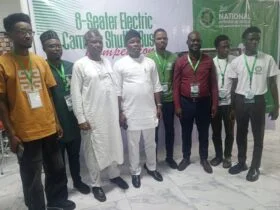University of Benin (UNIBEN), Edo State, has emerged as the overall winner of the National Automotive Design and Development Council’s (NADDC) inaugural 8-Seater Electric Vehicle (EV) Campus Shuttle Bus Design Competition.
The grand finale, held on Friday at the University of Lagos (UNILAG), saw the Federal University of Technology, Owerri (FUTO) clinch the first runner-up position, while the University of Abuja secured the second runner-up spot.
The competition, which started on March 6, featured 12 participating universities from across Nigeria.
Mr Emmanuel Ikegwuonu, from the Department of Mechanical Engineering, UNIBEN, who made presentation on behalf of his team, said 50 per cent of the materials were locally sourced.
He explained partnership with local suppliers and auto manufacturers and how the design captured benefits of people, profit and the planet.
Prof. Osarobo Ighodaro, UNIBEN, who supervised the overall winning team, explained technicalities that went into the supervision and how it was simplified for the students.
Earlier, while announcing the winners, Prof. Ibrahim Rufai, from Bayero University Kano, explained the selection criteria and industrial requirements.
A team comprised of 20 people comprising 10 students from various faculties, five lecturers, two industry experts and the rest technicians.
Director-General, NADDC, Mr Oluwemimo Osanipin, after presentation of awards and plaques to winners and other stakeholders announced cash rewards for all participating schools.
Osanipin said each of the 12 participating schools would get N2 million, first runner-up N3 million, second runner-up to get N4 million and overall winners UNIBEN to receive N5 million.
He stated that the core aim of the competition was to foster local content in vehicle design for Nigerian use and potential export.
Osanipin described the university community as a fertile land for execution of any idea, adding that the competition was the first in the nation.
The DG explained multidisciplinary efforts that went into the electric vehicle design and the need for collaboration between all stakeholders toward production to promote Nigeria.
“They have built possibilities, and shown to us that we can have cleaner mobility in Nigeria,” he said.
Osanipin said that the next phase, involving the production of the vehicle in collaboration with the private sector and NADDC support, would begin immediately.
He commended the participating students, lecturers, the National Assembly, industry experts from automotive industries and other stakeholders.
He said the Renewed Hope Agenda of President Bola Tinubu advocates local production.
“Let us move towards the Nigeria that does not just consume but produce technology and export technology,” he said.
The Minister of State for Industry, Sen. John Enoh, represented by his Special Adviser, Mr Odunsanya Adedamola, said the initiative aligned with the vision and substance of the Nigerian Industrial Revolution Plan (NIPR).
“The NIRP, through the Nigerian Automotive Industry Development Plan (NAIDP), deliberately prioritises innovation, skills development, and local content.
“Hence, recognising that sustainable industrialisation and economic growth depend on cultivating homegrown solutions and technological capacity,” he said.
He said the collaboration between government, academia, and industry indicates possibilities when national policy, through instruments like the NAIDP, meets the energy and ingenuity of youths.
He thanked the students for their boldness and brilliance, urging them to continue to innovate boldly, build confidently, and drive sustainably in line with NIPR vision
Vice Chancellor of UNILAG, Prof. Folasade Ogunsola., represented by Prof. Wale Okunuga, Director, Research Management Office, explained how the initiative aligned with the institution’s green projects.
Other speakers, including National Assembly representative, explained the advantages of clean mobility for Nigeria and the opportunities of local electric vehicles production.
Other schools from the nation’s six geo political zones were: Ahmadu Bello University (ABU), Zaria; Usmanu Danfodiyo University, Sokoto; Modibbo Adama University of Technology (MAUTECH), Yola.
Others were the University of Nigeria, Nsukka; Obafemi Awolowo University, Osun; the University of Port Harcourt; University of Ilorin and Abubakar Tafawa Balewa University (ATBU), Bauchi.



